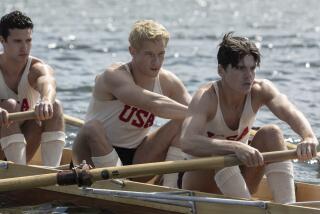Crimson Isn’t Too Green--Harvard Edges Penn in Classic : Crew Classic: Inexperienced group survives tough test to win Copley Cup for second consecutive year.
- Share via
SAN DIEGO — The Harvard men made things tough on the competition Sunday, but also made it tough on themselves. Still, the Crimson didn’t seem to mind.
A young, green Crimson 8 captured the Copley Cup for the second consecutive year, capping the 19th annual San Diego Crew Classic on a sun-splashed, breezy Mission Bay.
In a tight four-boat duel, Eastern invaders Harvard and Pennsylvania made it an all-Ivy League finish, with Harvard edging Penn by a bow length. On the clock, that meant an edge of 38/100ths of a second over 2,000 meters at Crown Point Shores.
The West fared better in the featured women’s race, with Washington winning the Whittier Cup by about a second and a half over defending champion Boston University.
With only one senior and three rowers back from last year--and entering its first competition of the season--Harvard was something of an unknown. Harvard had a new stroke who had never held that position, Didzis Voldins, and a new coxswain, David Weiden, both sophomores.
But it’s hard to say a team doesn’t have experience when its coach is in his 30th year, and Harry Parker’s latest edition proved to be up to a stiff test provided by Penn, Washington and Wisconsin.
Now, when Harvard returns to the East Coast, the Crimson will hold a title they didn’t expect when they arrived in San Diego; they’re the team to beat. Parker knows it, and with three more meetings with Penn, he was lukewarm in his congratulations to his team.
“Well done, great race,” he told them. “It’s just the start, though.”
He was more complimentary describing the race to the media: “I thought we rowed a great race, especially this tough a race this early.”
But Parker recognized the pressure Harvard put on itself by winning.
“The problem is it makes you the No. 1 target for everybody,” he said. “We have Penn again in three weeks and there are also some other teams laying in waiting for us. You could put yourself in a defensive position, though that didn’t happen last year.”
Junior Bill Cooper of Berkeley, one of three Harvard lettermen (along with twin brother John), agreed: “Definitely (Harvard is now a target). It’s a tough position to be in. You always have to look over your shoulder, you can never let down.”
But, he added brightly, “it’s also a good position to be in because it means you won.”
Cooper couldn’t decide if Sunday’s victory was a surprise because, he said, “We didn’t come in with any preconceived notions. We knew we’d be competitive, we just didn’t know how competitive.”
The victory provided Parker with his sixth Copley Cup.
The Whittier Cup also came down to a four-boat charge, with Washington leading most of the race while holding off Penn at the midway point and Radcliffe and Boston University down the stretch.
“We were two to three seats up early, then I looked out and Lane 4(Brown) was sticking out, so I started calling off Brown, then Boston started moving,” described Washington coxswain Kimberly Janzik.
“The rest of the race it was mostly BU and Radcliffe. We moved strong the last 500 (meters).”
Janzik said the Washington women have been helped by a mild winter in Seattle, allowing them to train on the water.
Washington’s victory wasn’t a huge surprise. Though Boston U. and UCLA won the past two Whittier Cups, Washington won the three previous years, won six titles in the 1980s and finished second on three occasions.
“This is a good start,” Janzik said. “Now we’re all excited.”
In the FISA World Cup single scull competition, 1989 world champion Elisabeta Lipa of Romania led wire-to-wire to hold off Anne Marden of the U.S. and defending world champion Silken Laumann of Canada for the women’s title.
Vaclav Chalupa of Czechoslovakia won the men’s race, beating friend and rival Kajetan Broniewski of Poland with an outstanding time of 6 minutes 52.09 seconds. The two roomed together while in San Diego and have been friends and competitors in Europe for years.
Marden, 33, two-time Olympic silver medalist, is shooting for another U.S. Olympic berth despite a demanding work schedule. She’s an investment analyst in London and trains year-round on the Thames.
“I’m pleased with the race and pleased how my training is going,” Marden said. Many of the younger American rowers are waiting for Marden to retire and end her stranglehold on U.S. single sculling, but Marden said she has no such timetable.
“I don’t like to dwell on that,” she said. “(Retirement) will happen sometime but the other girls should realize I’ve set a standard and they have to reach it. I think there are several on the way up. I’m just focusing on the (Olympic) trials.”
Sunday’s time change didn’t bother the 27-year-old Lipa, who has been on her own timetable since arriving Wednesday from Bucharest, which is 10 hours ahead of San Diego. She said she slept the better part of 30 hours but hasn’t slept much since. “I guess I was just ready,” she said.
“It’s very impressive she can come here, jump in a borrowed boat, be totally jet-lagged and win,” Marden said. “Elisabeta is a very strong athlete.”
Local teams didn’t fare well in the California Cup, which was claimed by the Long Beach State men and UC Davis women.
Long Beach, which won its fifth Cal Cup and received an automatic invitation to next year’s Copley Cup, was expected to battle San Diego State. The only challenge came from Santa Clara and the Long Beach won by five seconds. In the field of six, SDSU finished fifth and University of San Diego was third.
Davis breezed to the women’s title, beating Santa Clara by nearly 15 seconds.
It was a tough day all-around for San Diego State, which won the men’s novice race by nearly three seconds but was disqualified for using a coxswain with previous experience. The victory was voided and runner-up Orange Coast College was declared the winner.
SDSU’s novice coxswain became academically ineligible recently.
“It was an innocent mistake but they didn’t notify us,” a U.S. Rowing Assn. official said. “It’s a tough lesson to learn but that’s the rules.”
It proved to be terribly embarrassing--the Aztecs had already received their medals and had to track down the OCC team. Said one coach, “What’s next, the shirts off our back?”
Racing notes
The Cincinnati Rowing Club won the men’s 27-and-over masters division for the seventh consecutive year, beating the San Diego Rowing Club by less than a second. They’ve won every title since the division’s inception seven years ago. . . . Tish Reid of Great Britain was the classic’s only capsize victim. In a women’s World Cup race Sunday, Reid’s single scull turned over at the midpoint of the 2,000-meter course. That’s considered the “wind tunnel” section of the course because of a strong cross wind. . . . U.S. Rowing Assn. official to Harvard as the team prepared to dump coxswain David Weiden in polluted Mission Bay: “Don’t open your mouth.”


